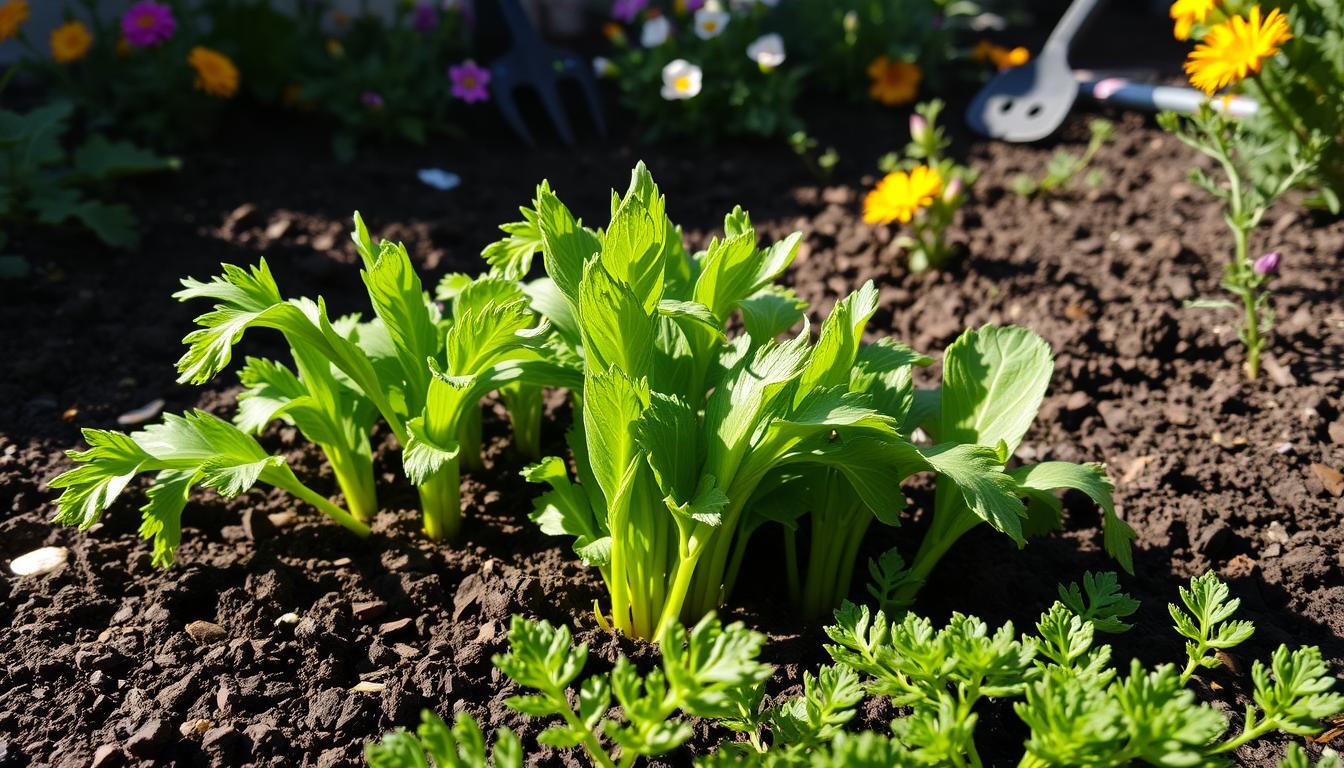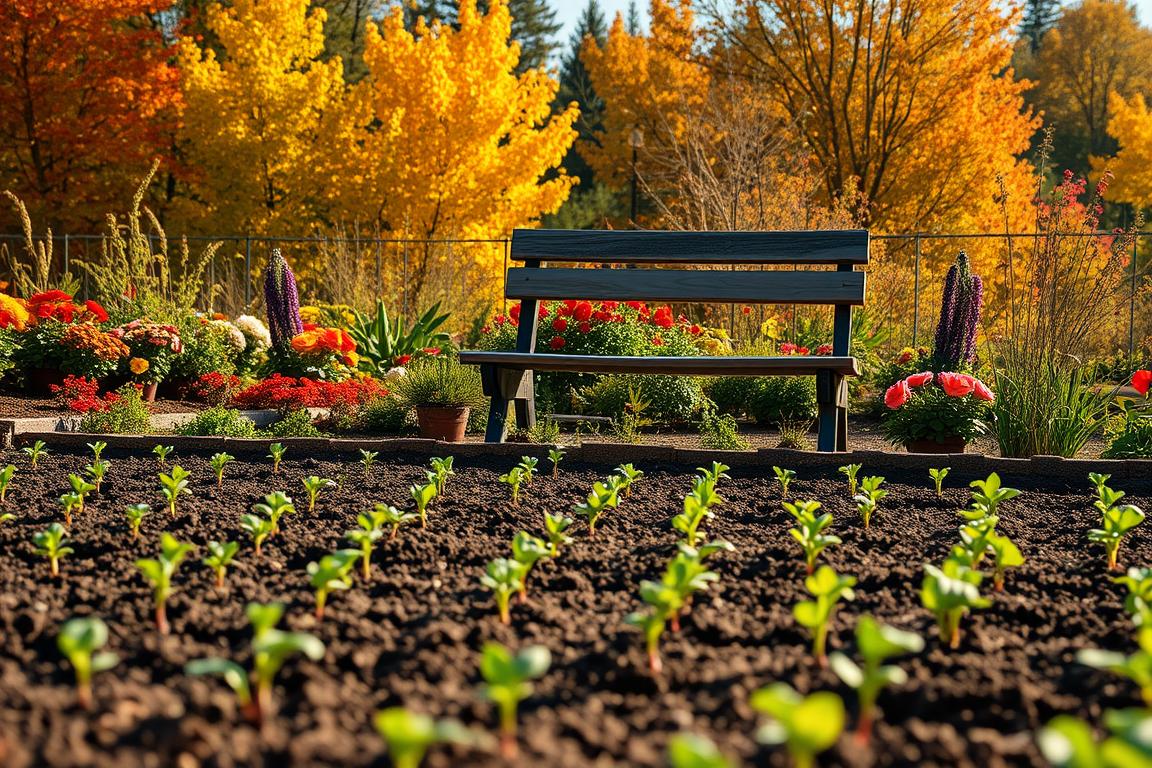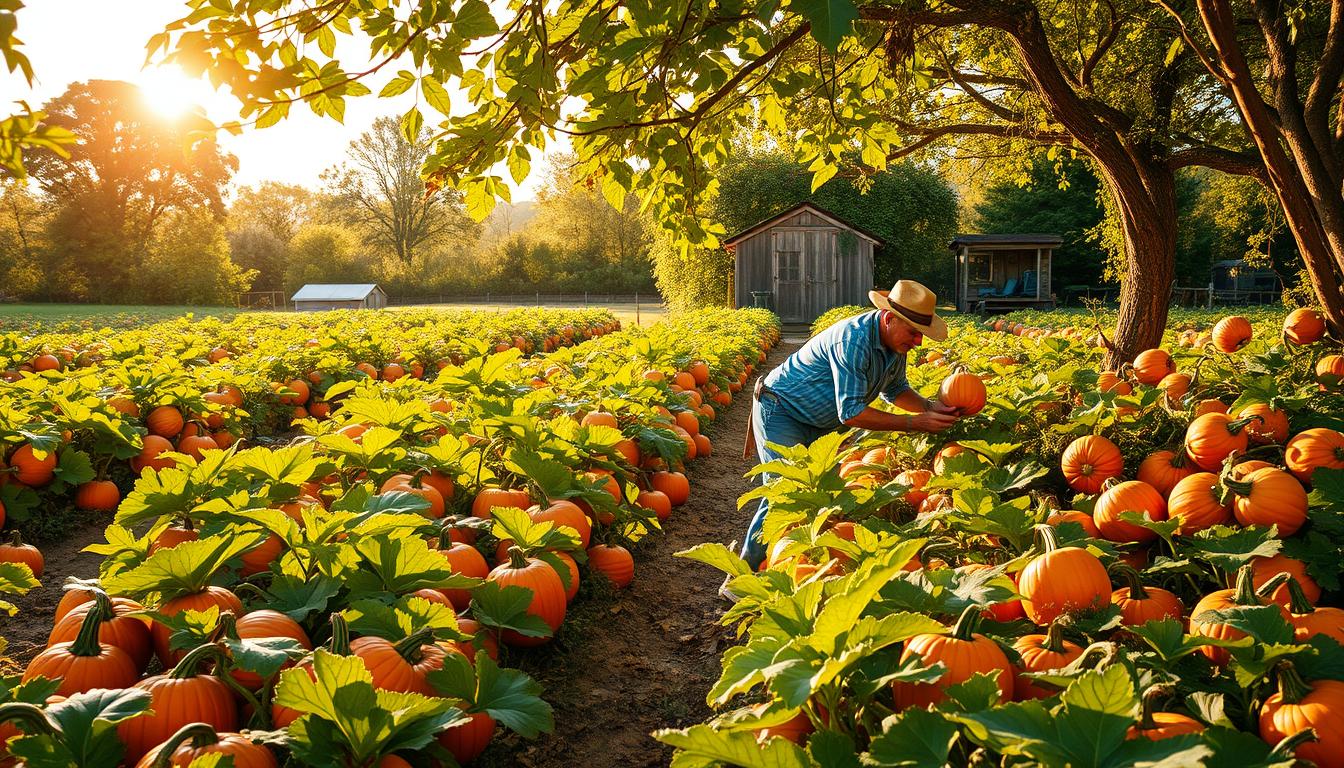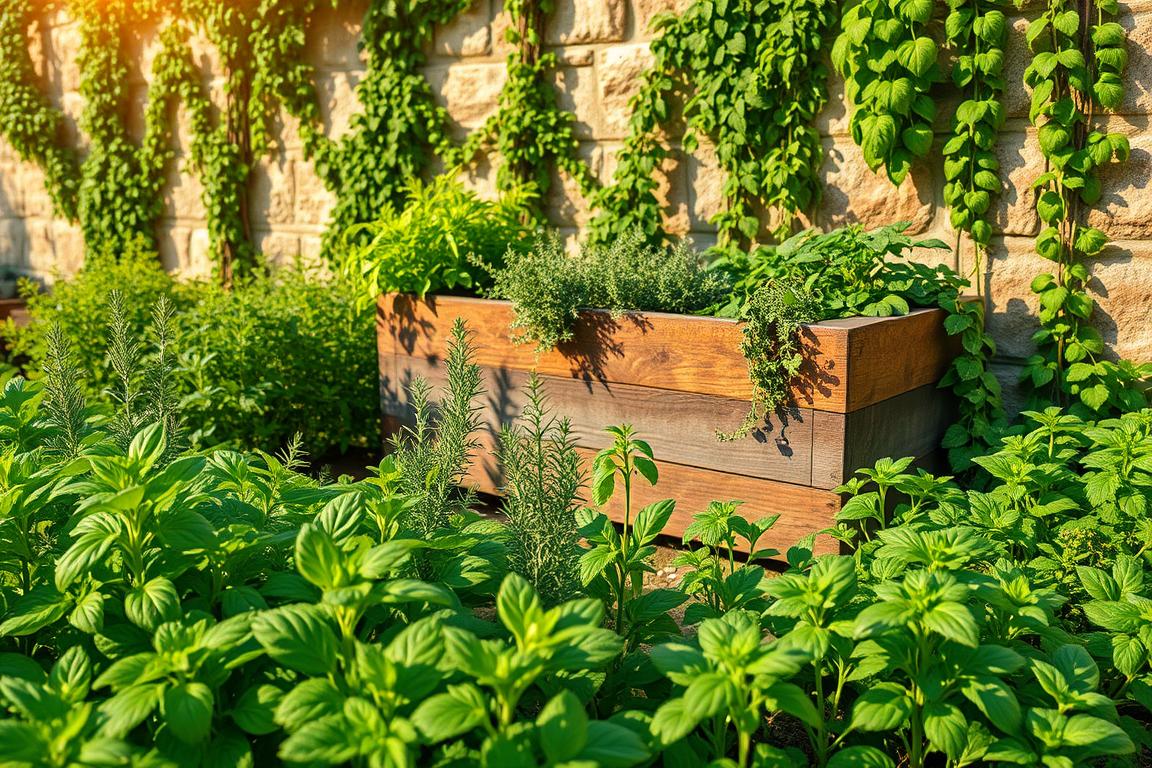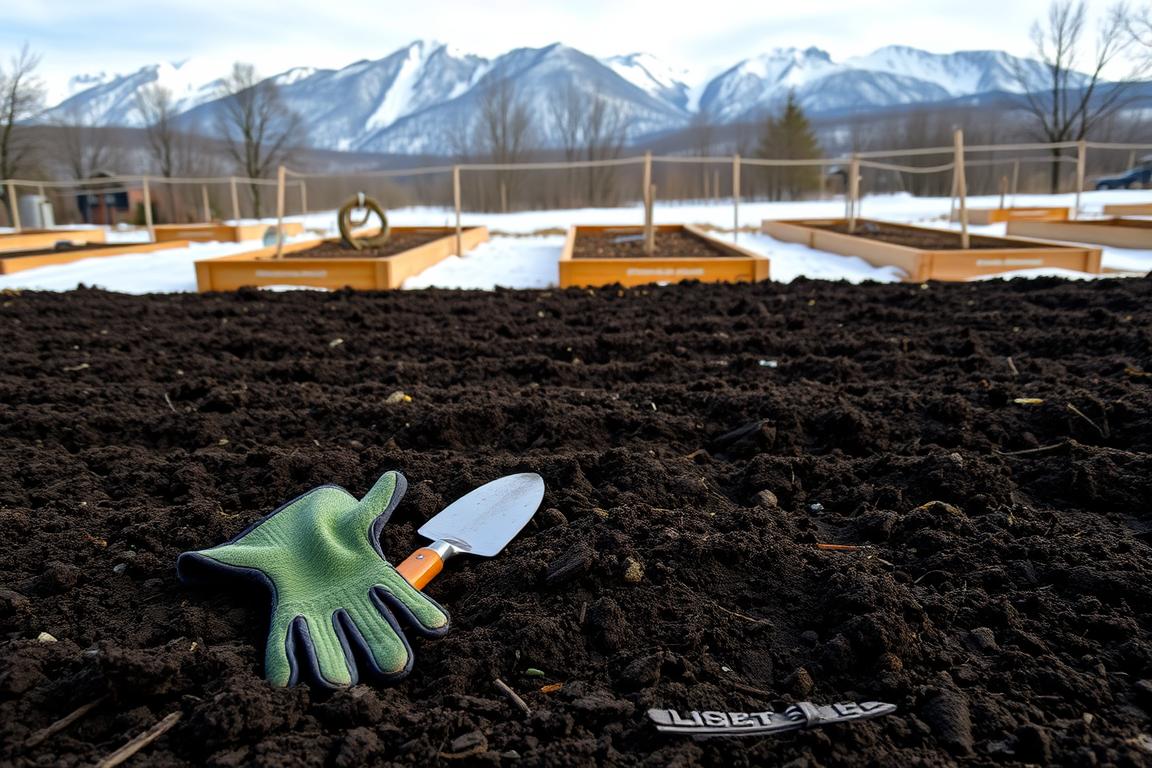To get a great carrot harvest, start with the right soil. Whether you’re using raised beds, containers, or a traditional garden, good soil is key. This guide will show you how to make your soil perfect for carrots, from seed to harvest.
Key Takeaways
- Understand the ideal soil composition for carrots, including pH levels and nutrient requirements.
- Learn how to fix and amend existing soil to create the perfect growing medium.
- Discover the importance of loose, well-draining soil and techniques for creating raised beds or containers.
- Master the art of planting carrot seeds correctly for successful germination and growth.
- Maintain optimal soil conditions throughout the growing season with proper watering, thinning, and weed control.
Understanding the Ideal Soil for Carrots
Carrots are a versatile and nutritious vegetable that thrive in specific soil conditions. To ensure optimal carrot growth, it’s essential to understand the ideal soil requirements. The best soil for carrots is a sandy loam that is well-draining and slightly acidic, with a pH range between 5.8 and 6.5.
Best Soil for Carrots
Carrots prefer a loose, well-draining soil that allows their roots to easily penetrate deep into the ground. The soil should be free of debris, rocks, and compaction, providing a smooth, unobstructed path for the carrot roots to develop. A sandy loam soil, which is a mixture of sand, silt, and clay, is an ideal choice as it offers the perfect balance of drainage and nutrient retention.
Why Soil Preparation is Crucial
Proper soil preparation is essential for ensuring straight, uniform carrot growth without deformities or stunting. By building a quality seedbed, you can create the optimal conditions for your carrot crop to thrive. This involves aerating the soil to improve drainage and incorporating organic matter, such as compost or well-rotted manure, to enhance nutrient content and soil structure.
Taking the time to prepare your soil for carrots will set your garden up for success, allowing you to enjoy a bountiful harvest of delicious, straight-growing carrots.
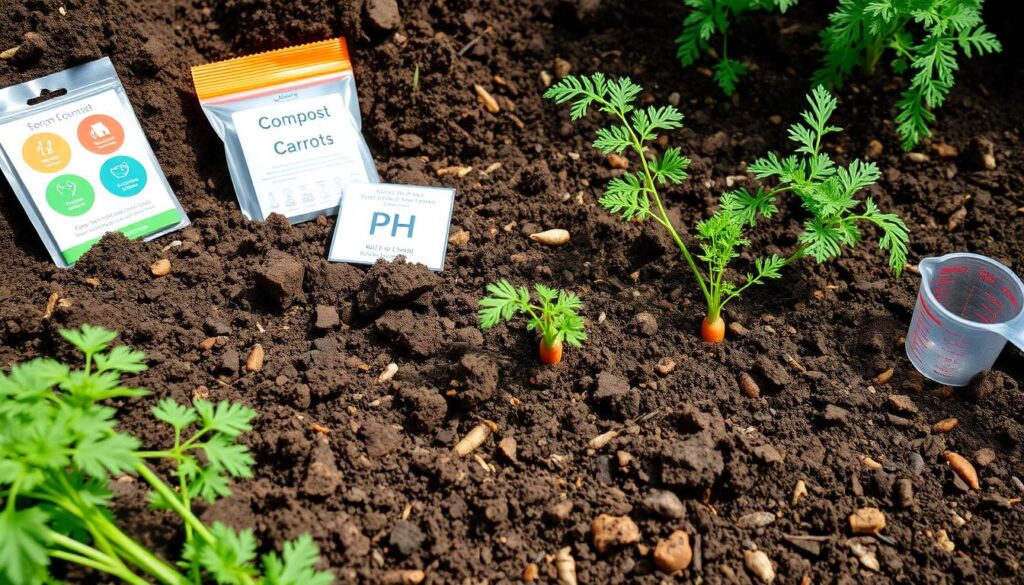
Fixing and Amending Your Existing Soil
If your garden soil isn’t right for carrots, don’t worry. You can fix it. Focus on adjusting the pH, loosening the soil, and adding organic matter. This will make your soil perfect for carrots.
Checking and Adjusting pH Levels
First, test your soil’s pH. Carrots like slightly acidic soil, between 6.0 and 6.8. If it’s too alkaline, add garden lime. For too acidic, use sulfur or acidifying agents.
Loosening and Aerating the Soil
Then, use a broadfork or tiller to loosen the soil. This breaks up compaction. It lets carrot roots grow well and get nutrients and moisture. Tilling and broadforking improve soil structure and drainage.
Incorporating Organic Matter
Lastly, add 2-4 inches of compost or organic amendments to your soil. This boosts soil structure and fertility. It also helps retain moisture and improve drainage for carrots. Adding organic matter makes your soil ideal for carrots.
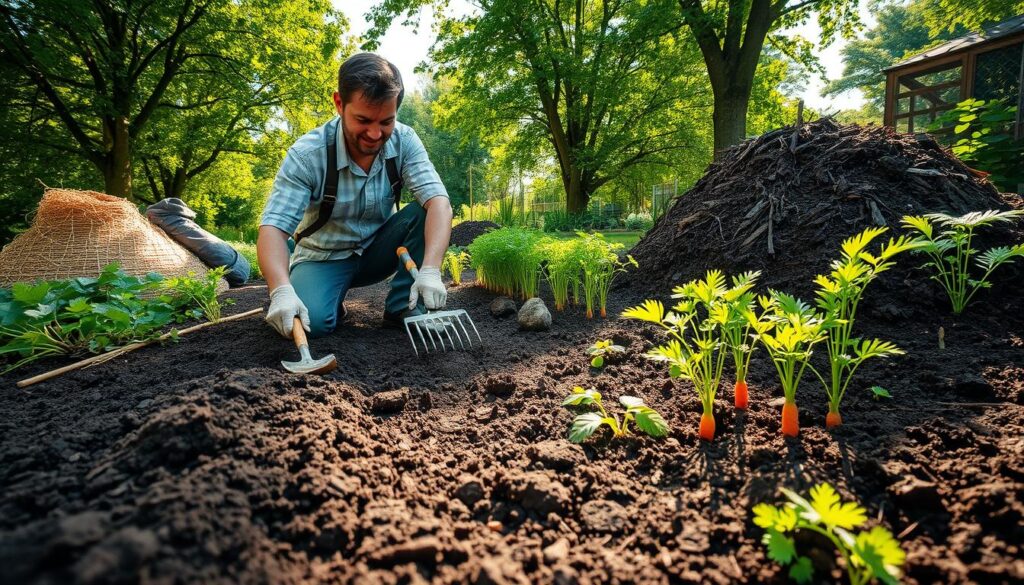
By following these steps, you can make your soil great for growing carrots. Healthy soil is key for a good carrot harvest.
How to Prepare Your Soil for Optimal Carrot Growth
To get a great carrot harvest, start with the right soil. Carrots love a deep, loose soil that drains well. This lets their roots grow straight and even.
It’s important to avoid heavy or compacted soils. These can make carrots grow deformed or stunted.
The Importance of Loose, Well-Draining Soil
Carrots need a deep, loose soil to grow their best. Heavy or clay-like soils can stop carrot roots from growing right. This makes the roots look misshapen or stunted.
It’s also key to have well-draining soil. Carrots don’t do well in waterlogged conditions.
Creating Raised Beds or Containers
Growing carrots in raised garden beds or containers is a smart move. These setups let you make a soil mix just for carrots. You can get the perfect mix of nutrients, drainage, and texture.
Raised beds also help with air in the soil and prevent it from getting too dense. This is great for carrot growth.
If you don’t have much space, try container gardening for carrots. Use big, deep containers with a mix that drains well. This gives your carrot roots the room they need to grow well.
Planting Carrot Seeds Correctly
Planting carrot seeds right is key for a good harvest. You need to think about how far apart and deep to plant them. Let’s look at the best ways to sow carrot seeds.
Proper Seed Spacing and Depth
For carrots to grow well, plant seeds 1-2 inches apart. This space lets them grow without getting too crowded. Carrot seeds should be planted 1/4 to 1/2 inch deep. If they’re too deep, they might not sprout.
Techniques for Successful Germination
- Keep the soil moist while the seeds are germinating. Use a light water system or pre-water the soil before planting.
- Carrot seeds take 2-3 weeks to sprout. So, be patient and keep the soil moist.
- Put a thin layer of compost or mulch over the seeds. It helps keep moisture in and prevents the soil from drying out.
By following these tips, you’ll get a great carrot harvest. The right spacing, depth, and soil moisture are crucial for carrot seeds to grow well.
| Seed Spacing | Seed Depth | Germination Time |
|---|---|---|
| 1-2 inches | 1/4 to 1/2 inch | 2-3 weeks |
“Proper planting techniques are essential for a bountiful carrot harvest. Pay close attention to seed spacing and depth to ensure successful germination.”
Maintaining Optimal Soil Conditions
For a great carrot harvest, it’s important to care for the soil well. Keeping the soil moist is key for your carrots to grow well. Water them lightly but often to keep the soil just right.
Watering and Moisture Retention
When watering carrots, aim for 1 inch of water a week. This can come from rain or a hose. Keeping the soil moisture for carrots steady is crucial. Too much or too little water can harm your carrots.
Mulching around your carrots helps keep the soil moist. It also stops weeds from growing.
Thinning and Weed Control
Thinning carrot seedlings is also important. When they’re a few inches tall, thin them to 1-2 inches apart. This lets the remaining plants get enough water and nutrients.
Also, get rid of weeds often. Weeds take away from what your carrots need to grow well.
| Soil Moisture Requirement | Optimal Seedling Spacing | Weed Control Frequency |
|---|---|---|
| 1 inch of water per week | 1-2 inches apart | Weekly |
By watering right, thinning seedlings, and controlling weeds, you’ll have the best soil for carrots. This will help them grow well and give you a big harvest.
Conclusion
Follow the steps in this guide to get your soil ready for growing great carrots. You’ll learn how to improve your soil, plant, and care for your carrots. These carrot growing tips will lead to a big, tasty harvest. Homegrown carrots are a tasty and healthy addition to any garden.
Success in growing carrots starts with good soil preparation. You need to adjust the pH, add organic matter, and make sure the soil drains well. Each step is crucial for your carrots to grow well. By focusing on these details, you’ll get a crop that’s both plentiful and delicious.
This guide is perfect for both new and experienced gardeners. It gives you all the info you need to grow healthy carrots. With the right soil care, you’ll soon enjoy the fresh, crunchy taste of your own carrots. Happy gardening!
FAQ
Q: What is the ideal soil composition for growing carrots?
A: Carrots love loose, well-draining soil that’s slightly acidic. The pH should be between 5.8 and 6.5. Make sure the soil is free of debris and rocks, so the roots can grow deep.
Q: Why is proper soil preparation crucial for growing carrots?
A: Good soil is key for straight, healthy carrots. A quality seedbed helps carrots grow well. Aerating the soil and adding organic matter are important steps.
Q: How can I fix and amend my existing garden soil for optimal carrot growth?
A: To fix your soil, first check the pH and add lime if needed. Then, loosen the soil with a broadfork or tiller. Finally, mix in 2-4 inches of compost to enrich the soil.
Q: What are the benefits of using raised beds or containers for growing carrots?
A: Carrots need deep, loose soil to grow right. Raised beds or containers with the right soil mix are great for this. They avoid compacted soils that can harm growth.
Q: How should I plant carrot seeds for the best results?
A: Plant carrot seeds 1-2 inches apart, covering them lightly. Don’t bury them too deep, as it can stop them from germinating. Keep the soil moist during germination.
Q: How do I maintain optimal soil conditions for my carrot crop?
A: Keep the soil moist but not too wet. Thin seedlings to 1-2 inches apart. Remove weeds to ensure your carrots get enough water and nutrients.


